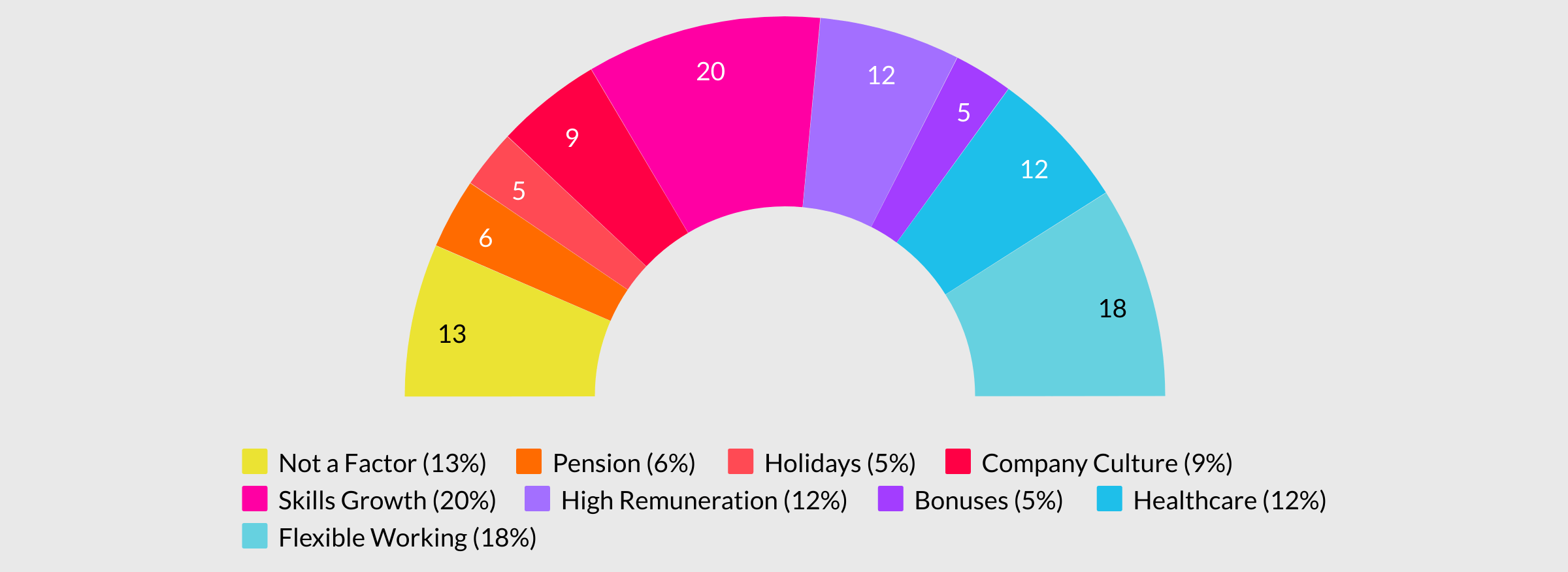High salaries, bonuses, benefits, and perks: a career in IT is renowned for being well-remunerated, and employers have gradually been required to offer larger and more comprehensive benefits packages, vying for attention with 'dream job' technology companies that have become known for their employee perks.
But how important are these metaphorical carrots really, when it comes to attracting and retaining the best technology talent?
In a two-part study focusing firstly on bonus structures and subsequently on broader benefits packages, we surveyed 3,128 technology professionals across a wide spectrum of position-types.
The answers may surprise you.
In a nutshell:
Bonuses are bust, and soft benefits like training and career development trump traditional perks like healthcare and pension.
Are bonus structures a deciding factor when considering a role?
When asked, a whopping 81% of technology professionals stated that bonus structures were either not a deciding factor or were considered far less important than other benefits. Most did consider bonuses a perk, just a less desirable one than other forms of financial reward. This is particularly the case if the bonus is either small or, interestingly, performance-based.
"I prefer shares to monetary bonuses."
QA Lead
"Bonuses aren't that important. Things like pension/private medical etc. are more important than extra added sums."
Python Developer
Many people considered bonuses an extension of their salaries. In fact, there was a strong undertone to conversations that bonuses were in reality part of base salary rather than a supplementary benefit.
Where the base salary was low, some respondents stated that they would consider bonuses worthwhile if they can help to make up the difference in monetary expectations.
Nonetheless, 30% of people surveyed stated explicitly that base salary was a higher priority. Of these, 15% (so 4% of the total) would consider a bonus a deciding factor, but still only secondary to a high base salary.
"When I worked permanent roles in the past, I used the bonus to help increase overall package if the company cannot offer a high enough base salary."
Java Developer
"I had a bonus in my last role but accepted my current position with no bonus as the base was slightly higher."
Senior .NET Engineer
Bonuses are often introduced as a method of incentivising employees. While there were some professionals that admitted that a bonus structure would likely make them work harder, one respondent* cited that it was the motivational effect that bonuses had on their team members that made bonuses worthwhile in her opinion.
- As only one respondent explicitly mentioned this, we did not consider it a key finding, but it certainly suggests that bonus structures appeal to a specific mentality or psychology, and thus could be utilised to direct team structure or values.
All of the above being said, those that did attribute importance to bonuses did so decidedly.
3% said that they expected it as part and parcel of a role and would question the company or job if bonuses were not offered.
"The bonus has to be there. It can be shares/cash/holidays, but there has to be something to keep employees motivated, otherwise I would question the role/company."
UX/UI Developer"A bonus is important. I've always had one in previous roles and it's definitely something I always look for, although wouldn't mind forfeiting it if the base is a lot higher. I believe that bonuses motivate people to go the extra mile in their roles"
Python Developer
So, if it's not monetary bonuses, then what is the most important part of a benefits package?
Responses varied considerably, but the broad topics prioritised include many of those that you'd expect:
20% of applicants surveyed prioritise Skills Growth, i.e. training budgets, detailed career paths, conference attendance, L&D departments, visiting speakers, etc
18% of applicants prefer some form of Flexible Working, i.e. Work from Home schemes, flexitime, or remote working
12% of applicants focus on High Remuneration Other Than Bonuses, i.e. higher-than-average salaries (most of these), commuting budgets/travel cards, or shares/stock options.
5% of applicants focus on Bonus Structures.

So, how can your perks compete if it's impossible to compete with the highest salaries on the market?
Tailor benefits packages to each individual
Every individual is different, and one size often doesn't fit all.
The easiest way to find out which perks will seal the deal is simply to ask! Ensure you also listen carefully for any signals given by interviewees as they progress through your hiring process. What is truly important to them, as individuals? Are they interested in gym benefits or food allowances? Is commuting providing a challenge that you can help to alleviate, either through travel or bike schemes? Would bringing their own device, or being eligible for a tech loan, make the difference between joining your team or signing on the line elsewhere?
Ask them, consider your options, and create the most appealing package possible, tailored to them.
Create flexible or multiple benefits packages
If custom tailoring benefits sounds like a logistical nightmare, then providing the ability to choose between several packaged benefits options can be an easier way to offer personalisation without much difficulty.
Create a few (say, 3 to 5) different benefits packages that each offer equal value through different options, appealing to the different ages, career stages and priorities of your employees. Perhaps one could be more health and family-oriented, perfect for professionals with young families. Another could offer lifestyle benefits and bonuses structures, or retail and travel discounts.
Creating multiple employee 'personas' is a good way to form these packages, to ensure benefits are not overly one-dimensional or skewed. And, by allowing your employees to select the best option for them, you ensure their satisfaction with their benefits going forward.
Embrace a learning culture
Technology is constantly evolving, daily. To stay relevant and to give your business the best chance of success and rapid growth, technology professionals need to keep learning. Skills growth and opportunities for learning were cited as the key benefits of choice for respondents, but the importance of having modern technical stacks and tooling cannot be overstated.
When questioned, our respondents showed a clear interest in using new technologies, frameworks and tools. Some of the tools and languages specified included Selenium, REST Assured, Python, React Hooks, AWS, Cloud technologies, Android development, and Ruby.
"Flexible working and tech stack are the most important elements of a role."
Java Developer
"It is more important at this stage in my career to find a role that will allow me to work with automation testing, more so than bonuses or benefits."
Senior .NET Engineer
Offer benefits that empower your employees to constantly learn. That could include courses, training opportunities, eLearning platform memberships, and workshops.
A low-budget option that has proven results is allocating 'free time' for employees to work on their own projects at certain points during the working week.
For example, you could offer 'Free Fridays' – afternoons where, in the event of no business-critical work in the pipeline, staff can tinker and test their own projects or learn new languages.
Evolve your benefits packages to meet the needs of the times
Ordinarily, childcare benefits include parental leave, and perhaps kindergarten allowances – all of which focus primarily on young families. Now, however, childcare needs are evolving to include longer-term family time – as seen by respondents' focus on having holiday allowances and flexible work options, explicitly to be able to spend time with their families.****
"Ideally I would like to work from home at least two days a week. I've found it helps immensely with childcare. It also allows me to just generally see my family more, which is great."
Business Analyst
"I have two young children, so I prefer jobs that allow me some work-life balance in the form of holiday allowances or flexi-hours, so I can see them more."
Front-End Developer
"Flexible working lets me pick up my daughter from school. That's really important to me."
Senior JavaScript Engineer
What this shows is that employees consider the childcare aspect of benefits to encompass more than parental leave.
Staying abreast of current events and political tides that may affect your staff – such as Brexit – would also be beneficial, both to your company and your employees.
Being a metropolitan city, London has always been a hub for business. According to figures from LinkedIn and Stack Overflow as reported by London and Partners, London is the number one destination in Europe for international technology workers, with TechUK estimating the number of new EU citizen hires in the technology sector being as high as one in every six.

